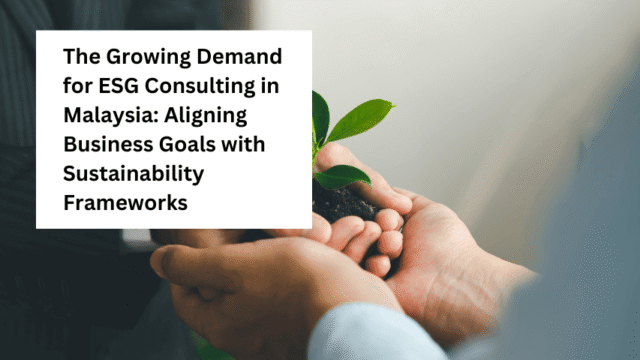Businesses around the world are beginning to prioritize sustainability, and Malaysia is no exception. The rising demand for Environmental, Social, and Governance (ESG) consulting in the country sheds light on how companies are transforming their strategies not just to comply with global regulations but to thrive as responsible corporate entities. This article explores the rising role of ESG consulting in Malaysia, the factors driving this demand, the benefits of integrating ESG practices, and the challenges companies face along the way. We’ll also highlight notable successes in this space and provide insights into the future of ESG consulting in Malaysia.
What Is ESG Consulting?
ESG consulting refers to the guidance provided by experts to help organizations develop, implement, and continuously improve their environmental, social, and governance practices. These consultants bridge the gap between regulatory compliance, stakeholder expectations, and sustainable growth. Their role involves helping businesses identify ESG risks, establish goals in line with global sustainability frameworks, and ensure strategic alignment with their overall business objectives.
ESG is no longer a “nice-to-have” but a critical aspect of business strategy. Companies across Malaysia are turning to top ESG consultants like Wellkinetics for tools, expertise, and guidance on navigating this complex, multi-faceted landscape.
Why ESG Is Gaining Momentum in Malaysia
A confluence of global trends and local drivers are pushing Malaysian companies to prioritize ESG. Some of the key reasons ESG consulting is in high demand include:
1. Regulatory Pressures
Malaysia’s regulatory landscape is evolving to promote sustainability. Initiatives such as the Malaysian Code on Corporate Governance (MCCG 2021) emphasize the significance of ESG considerations for publicly listed companies. The introduction of green taxonomies by Bank Negara Malaysia further signals the importance of aligning with sustainability goals.
Additionally, companies listed on Bursa Malaysia are now bound to include sustainability-related disclosures in their annual reports. ESG consultants are pivotal in helping these firms comprehend and fulfill these requirements effectively.
2. Global Sustainability Trends
Malaysia is deeply connected to global markets, and multinational corporations are now demanding greater accountability in supplier networks. Consumers are also scrutinizing businesses’ environmental and social impacts, favoring companies that demonstrate transparency and sustainable practices. Consequently, Malaysian businesses are feeling the pressure to adopt ESG frameworks to remain competitive internationally.
3. Corporate Responsibility and Stakeholder Expectations
Beyond compliance, organizations are recognizing the importance of contributing to the broader societal good. Investors, customers, and employees increasingly favor companies that show genuine commitment to sustainability. Adoption of ESG principles gives Malaysian firms a reputational edge, attracting stakeholder trust.
4. Economic Sustainability Post-Pandemic
COVID-19 highlighted social and environmental vulnerabilities around the globe. For Malaysia, this underscored the need for more resilient and sustainable business models. ESG practices are seen as a proactive approach to mitigating long-term risks and fostering economic stability amidst global uncertainties.
The Role of ESG Consultants in Malaysia
Professional ESG consultants play an integral role in the corporate landscape by empowering businesses to align their goals with internationally recognized sustainability frameworks. Here’s how they help:
1. Assessing ESG Risks and Opportunities
Consultants conduct in-depth assessments of a company’s operations, identifying key ESG risks and opportunities. These risks could include climate impact, supply chain vulnerabilities, or social inequalities, while opportunities may lie in renewable energy adoption or circular business models.
2. Developing ESG Strategies
ESG consultants help companies develop actionable strategies, setting measurable goals based on environmental, social, and governance priorities. Using frameworks such as the United Nations’ Sustainable Development Goals (SDGs) or the Global Reporting Initiative (GRI), they ensure that these strategies align with reputable international benchmarks.
3. Assistance with Reporting
Navigating ESG reporting frameworks can be challenging, particularly for firms unfamiliar with the nuances of these standards. ESG consultants guide companies through sustainability reporting requirements, making compliance accessible and efficient.
4. Fostering Stakeholder Collaboration
By building bridges between company leadership, employees, and external stakeholders, consultants foster collaboration on sustainability objectives. This includes cultivating partnerships with NGOs, government agencies, and local communities to amplify social impact.
5. Driving Innovation
Many ESG initiatives spark innovation by encouraging companies to think differently about resource utilization, waste management, and new product development. ESG consultants help businesses uncover such opportunities, emphasizing their potential financial and operational benefits.
The Benefits of Adopting ESG Practices
Integrating ESG practices isn’t just an ethical move; it makes good business sense. Companies that work with ESG consultants enjoy a host of benefits, including:
1. Enhanced Brand Reputation
Adopting ESG principles helps businesses build trust with stakeholders and differentiate themselves in the marketplace as environmentally and socially responsible organizations.
2. Attracting Capital
Investors today are more inclined to fund companies with strong ESG profiles. Adhering to sustainability frameworks not only improves investor confidence but also makes businesses eligible for green bonds and other sustainable financing options.
3. Risk Mitigation
By incorporating ESG, firms minimize risks linked to environmental degradation, regulatory compliance, and societal backlash. Such practices foster long-term resilience and reduce financial liabilities, such as carbon tax penalties.
4. Improved Employee Engagement
Employees are seeking purpose and meaning in their roles. Companies with impactful ESG policies often see higher levels of employee engagement, retention, and satisfaction.
5. Greater Operational Efficiency
Implementing sustainable practices like energy efficiency and waste reduction can bring significant cost savings. ESG consultants often identify opportunities to use resources more effectively, optimizing operations.
Challenges in ESG Adoption in Malaysia
Although the benefits are clear, transitioning to ESG frameworks isn’t without its challenges. Malaysian companies face several hurdles, including:
1. Knowledge Gaps
A lack of understanding about ESG among company leadership and teams can impede progress. Many firms require educational support to grasp the long-term value of ESG compliance.
2. High Initial Investment
Implementing ESG-related practices often involves upfront costs. While these initiatives yield savings and profit opportunities in the long-term, smaller companies may struggle with limited budgets.
3. Complexity of Reporting
Navigating reporting methodologies can be overwhelming, especially for businesses unfamiliar with global standards. From carbon emissions metrics to diversity statistics, compiling this data accurately is a painstaking task.
4. Resistance to Change
Cultural resistance to change hinders ESG transitions. Organizations accustomed to traditional models may struggle to move toward sustainability-focused ways of working.
5. Balancing Priorities
While ESG is essential, companies often grapple with balancing sustainability goals against short-term financial targets. Ensuring leadership commitment to ESG without sacrificing profitability is a delicate act.
Success Stories of ESG Initiatives in Malaysia
Despite the challenges, a growing number of Malaysian firms are successfully implementing ESG initiatives, showcasing the feasibility of sustainability-focused transformation.
Example 1: CIMB Group Holdings
One notable success is the CIMB Group Holdings, which has incorporated robust ESG principles into its corporate strategy. CIMB is one of the first banks in Malaysia to fully integrate sustainability into its business model through its Green, Social, Sustainability Impact Products and Services Framework. This move not only aligns the bank with global standards but also strengthens its appeal among investors.
Example 2: Petronas’ Sustainability Agenda
Petronas, Malaysia’s multinational energy corporation, has committed to achieving net-zero carbon emissions by 2050. Its ESG efforts focus on renewable energy adoption, carbon capture initiatives, and biodiversity conservation. Through these measures, Petronas is setting a leading example for the energy sector.
Example 3: Top Glove Corporation
Top Glove, the world’s largest glove manufacturer, is addressing social sustainability by improving employee welfare, ensuring ethical labor standards, and engaging in community development projects. ESG consulting has helped the company enhance worker satisfaction while meeting global compliance requirements.
The Future of ESG Consulting in Malaysia
The future of ESG consulting in Malaysia looks promising as demand continues to grow across industries. Key trends shaping ESG consulting in the region include:
1. Technology Integration
Advanced tools like AI-driven ESG analytics and blockchain for supply chain traceability are expected to redefine how consultants deliver value to businesses. Technology will enhance both data collection and reporting accuracy.
2. Sectoral Growth
Energy, manufacturing, and agriculture sectors are likely to see accelerated adoption of ESG consulting, driven by both regulatory demands and global trade expectations.
3. Government Incentives
Greater support from the Malaysian government, through subsidies, tax incentives, and grants, will encourage more small- and medium-sized enterprises (SMEs) to engage with ESG principles.
4. Deepened Focus on Social Governance
While environmental concerns have been the primary focus, the “S” and “G” components of ESG are gaining traction in Malaysia, driven by the government’s focus on social inclusivity and anti-corruption measures.
Final Thoughts
The shift toward ESG principles in Malaysia represents a pivotal change in how businesses plan for the future. ESG consulting has emerged as a crucial enabler, helping firms align profitability with sustainability. By overcoming challenges and leveraging expert guidance, Malaysian companies can position themselves as global leaders in ESG excellence.
With growing stakeholder expectations and an increasingly complex regulatory landscape, businesses that fail to act risk losing relevance. The time for Malaysian companies to integrate sustainable practices is now, and ESG consultants will continue to play a key role in this transformation.








Hi, I do think this is an excellent site.
I stumbledupon it 😉 I am going to come back yet again since i
have bookmarked it. Money and freedom is the best way to change, may you be rich and continue
to help other people.